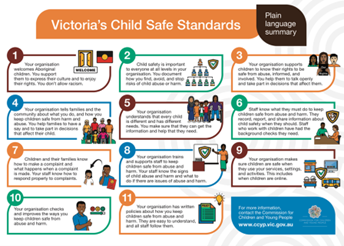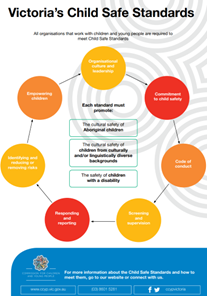Student Wellbeing
At St Margaret’s Primary School, student wellbeing is our top priority. We take a whole-school approach to support the social and emotional development of all our students, ensuring they feel safe, valued, and respected.
Our Commitment
- Safe and Nurturing Environment: We provide a secure and dynamic learning community where every child is valued.
- Achieving Potential: Our curriculum is designed to challenge students to reach their highest potential. We focus on developing knowledge, skills, and resilience to help students become successful and empathetic members of the community.
- Support Systems: We offer additional support for students who need it. We have a school psychologist onsite throughout the week to support our students. Our school is also part of the National Student Wellbeing Program (NSWP) which allows us to offer additional support to students as required.
Mental Health Awareness
We understand the importance of mental health:
- 1 in 4 adolescents have a mental illness.
- 1 in 7 primary school children have a mental illness.
- 1 in 5 adults will experience mental ill-health each year.
- 65% of adolescents do not seek help for mental illness.
For support with mental health and wellbeing, please contact the Principal, Deputy Principal, Mental Health Leader and our Wellbeing Leader.
Behavioural Support
- Behaviour Curriculum: Our explicit behaviour curriculum is taught during the first few weeks of Term 1.
- Behaviour Management: We have a behaviour management process to help students make better choices. This includes both positive and negative consequences to guide behaviour.
At St Margaret’s, we are dedicated to creating an environment where every student can thrive academically and emotionally.
Attendance
Relationships between people, and partnerships within communities, encourage students to connect, grow and flourish.
At St. Margaret’s we believe regular school attendance is key to improved education and health outcomes.
Positive engagement with schooling enhances academic and wellbeing outcomes for children and young people. We believe that when students attend school regularly they are in a better position to build positive relationships that enhance their sense of self and their relations with the people and groups around them.
School attendance is important as it maximises life opportunities for children and young people by providing them with education and support networks. Positive engagement with schooling enhances academic and wellbeing outcomes for children and young people.
In accordance with the Education Training and Reform Act 2006 (Vic.) (the Act) and the Education and Training Reform Regulations 2017 (Vic.), school attendance is compulsory for children and young people aged from 6 to 17 years unless an exemption from attendance has been granted through Exemption from School Attendance or Enrolment, Department of Education (DE).
Whilst ensuring student attendance at school is the legal obligation of parents/guardians/carers, supporting students to attend school each day is the shared responsibility of all parents/guardians/carers, students, the school, and the wider community.
Attending school every school day for the whole day enables students to participate in the school’s educational program as well as develop their social skills. Regular attendance enables the school to:
- plan an organised educational program that is delivered in a consistent way and has continuity
- facilitate shared student learning experiences that support the educational program
- monitor student progress and adjust the educational program to meet student needs.
Roles and responsibilities for school attendance
Parent/guardian/carer
Parents/guardians/carers must enrol a child of compulsory school age at a registered school and ensure the child attends at all times when the school is open for instruction or the student is registered for home schooling. For absences where there is no exemption in place, the parent/guardian/carer must promptly provide an explanation on each occasion to the school.
Students
Students are expected to attend the school in which they are enrolled during normal school hours every day of term, unless there is an approved exemption from school attendance for the student, or the student is registered for home schooling.
Principal
The principal must ensure that:
- the school has an attendance policy and procedures that outline the processes in place to implement this policy
- attendance records are maintained – daily attendance of each student enrolled at the school is recorded at least twice a day in primary schools
- any absences of a student from school, are identified reasons for each student’s absence are provided and recorded
- explanations for absences that are provided are a reasonable excuse for the purposes of their responsibilities under the Act
- any unexplained absences of a student are followed up by contacting the parent/guardian/carer of the student as soon as practicable on the same day
- if contact cannot be made with the relevant parent/guardian/carer, contact should be made with the emergency contact/s nominated on the student’s file held by the school
- information regarding a student’s unsatisfactory attendance at school or classes is recorded on their student file
- initiatives are implemented which aim to promote parental/guardian/carer awareness of the importance of children attending school every day
We know that from time to time children are unwell. You can regularly check your child’s attendance by logging into your PAM (Parent Access Module) account or by notifying the front office. Attendance is also displayed on middle and end of year student reports.
Child Safe Standards
- Culturally Safe Environments: Establish a culturally safe environment in which the diverse and unique identities and experiences of Aboriginal children and young people are respected and valued.
- Child Safety and Wellbeing Guidance: Ensure that child safety and wellbeing are embedded in school leadership, governance and culture.
- Child and Student Empowerment: Children and young people are empowered about their rights, participate in decisions affecting them and are taken seriously.
- Family Engagement: Families and communities are informed and involved in promoting child safety and wellbeing.
- Diversity and Equity: Equity is upheld and diverse needs are respected in policy and practice.
- Suitable Staff and Volunteers: People working with children and young people are suitable and supported to reflect child safety and wellbeing values in practice.
- Complaints Processes: Ensure that processes for complaints and concerns are child focused.
- Child Safety Knowledge, Skills and Awareness: Staff and volunteers are equipped with the knowledge, skills and awareness to keep children and young people safe through ongoing education and training.
- Child Safety in Physical and Online Environments: Physical and online environments promote safety and wellbeing while minimising the opportunity for children and young people to be harmed.
- Review of Child Safety Practices: Implementation of the Child Safe Standards is regularly reviewed and improved.
- Implementation of Child Safety Practices: Policies and procedures that document how schools are safe for children, young people and students.
https://www.vic.gov.au/protect



Student Leadership
Leadership Opportunities at St Margaret’s Primary School
At St Margaret’s Primary School, we offer a variety of formal leadership opportunities for our Year 6 students. These roles allow students to work closely with staff members throughout the year to organize events both within the school and in the local community.
Our Leadership Philosophy
- Student-Centered Learning: We believe that students should be at the center of their learning and have true ownership of their school. They are given opportunities to contribute to decisions, voice concerns, and make suggestions for school improvements while becoming more aware of the wider community.
- Lifelong Leadership: Leadership is integral to lifelong learning. Every student should have the opportunity to demonstrate and develop leadership skills.
Student Leadership Roles
Leadership roles at St Margaret’s include:
- School Captains
- House Captains
- FIRE Carrier Leaders (Year 5 & 6 opportunities)
- Sustainability Leaders
- Social Justice Leaders
- ICT Leaders
Students aspiring to these roles are expected to demonstrate, understand, and model our core values in all aspects of school life.
School Captains
School Captains pledge to:Be respectful, positive learners.
- Follow the school’s values.
- Treat everyone equally.
- Involve everyone’s voice in decision-making.
- Make positive changes to improve the school.
House Captains
House Captains aim to:
- Encourage participation in events and ensure everyone has fun.
- Display good sportsmanship and provide extra support to those in need.
- Be kind and approachable.
- Follow St Margaret’s core values to be exemplary sports leaders.
- Take pride in maintaining sports equipment.
Student Leaders
Other Student Leaders are committed to:
- Making St Margaret’s a better place.
- Planning and implementing extra activities and fundraising events.
- Modeling the core values and encouraging others to do the same.
Leadership Attributes
Ideal student leaders at St Margaret’s possess a range of wonderful qualities. These skills and attributes include, but are not limited to:
- Responsibility: Taking ownership of their actions and duties.
- Integrity: Demonstrating honesty and strong moral principles.
- Empathy: Understanding and sharing the feelings of others.
- Communication: Effectively expressing ideas and listening to others.
- Collaboration: Working well with others to achieve common goals.
- Initiative: Being proactive in identifying and solving problems.
- Resilience: Bouncing back from challenges and setbacks.
- Respect: Valuing and considering the perspectives and rights of others.
At St Margaret’s, we are proud to nurture the leadership potential in every student, preparing them to be influential and responsible members of the community.
Student Wellbeing


